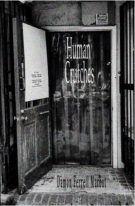 Marbut, Damon Ferrell. Human Crutches. BareBack Press. 2014. $10. 90p. PB. 9780992035587.
Marbut, Damon Ferrell. Human Crutches. BareBack Press. 2014. $10. 90p. PB. 9780992035587.
“But have you seen the folks that come into this place?” So ends the first poem in Damon Ferrell Marbut’s new poetry collection, Human Crutches. Set in and around an unnamed bar in New Orlean’s French Quarter, these character-driven poems give a glimpse into the life and environs of this one-of-a-kind locale. With a variety of unique voices and an ear for the flow of natural language, Marbut has constructed a collection that succeeds in accurately conjuring a busy watering hole.
In a odd way, this collection reminded me of Edgar Less Master’s Spoon River Anthology. Instead of a cemetery of dead people remembering and lamenting their lives, however, Marbut’s collection is full of the endlessly changing parade of faces that walk in and out of a busy gay bar in New Orleans over the years. The speakers run the gamut from exhausted to overjoyed, from on the down low to out and proud, with wide swaths of the in-between. Some of the bar’s patrons are chatty, with long, multi-part poems. Others barely have ten words to say. The entirety of this comes together in a feeling of expansiveness that belies the slim volume in the reader’s hand.
The same expansiveness may wear on some readers. Although this is a bar full of colorful characters (and the poetic musings that come with them), I felt as if I were walking into a bar for the first time and eavesdropping on the regulars. Everybody seems to know each other already, and I was playing catch-up the whole time. The reader can hear interesting snatches from people’s lives, but no single story runs throughout except the “Directly from the Training Manual” line of poems that instructs new bartenders how best to survive this job. That could be the point: the staff is the most stable part of this setting, and you’re never going to get the whole story from inside the bar.
This collection is truly greater than the sum of its parts. While readers may not care for individual poems (for example, I didn’t like the haikus written on napkins that had been photographed), the larger feeling of the entire collection makes up for any individual rough spots. This is recommended to any library that collects poetry or has a strong interest in New Orleans or the French Quarter.
John Mack Freeman
